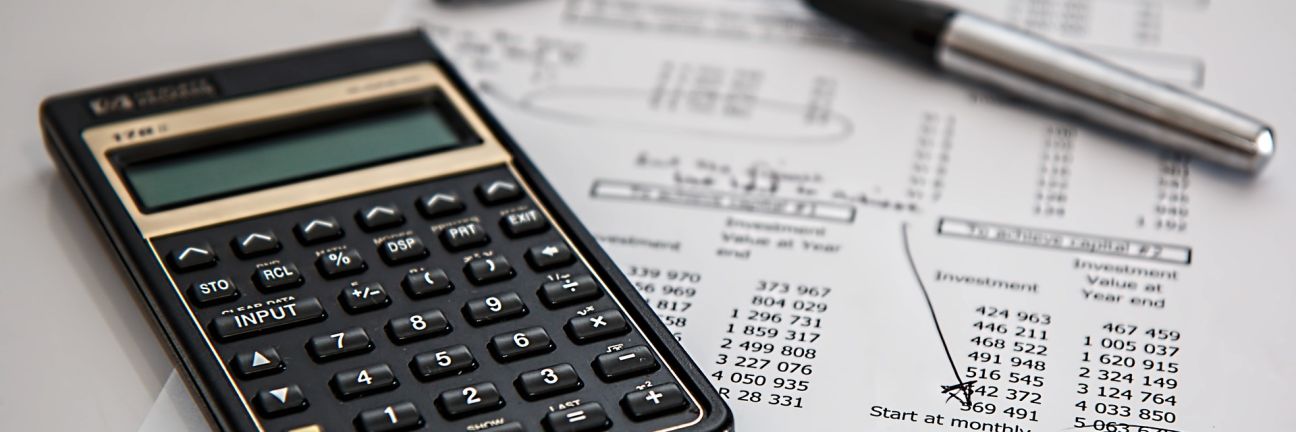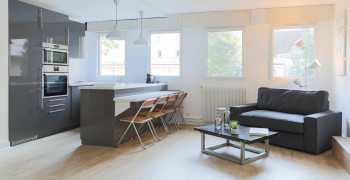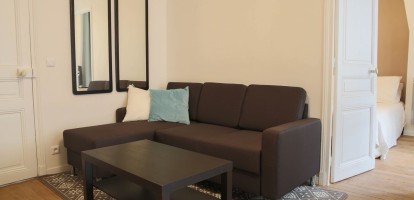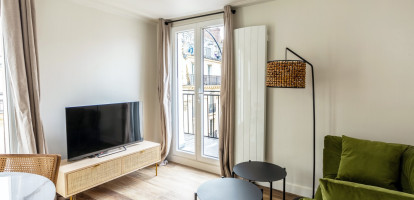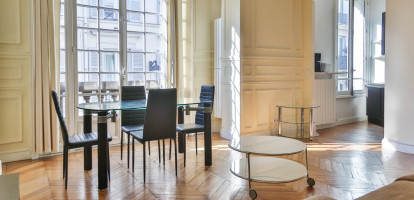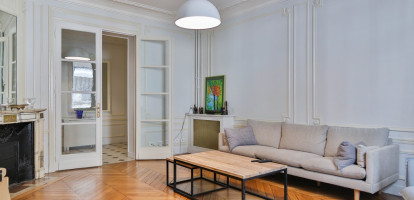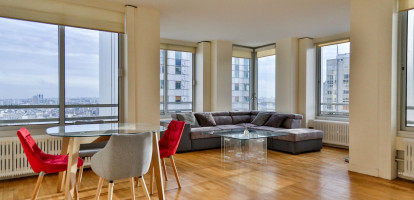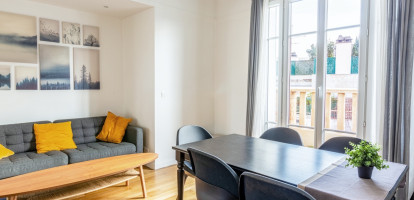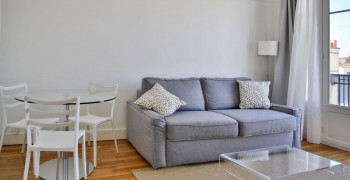What kind of rental charges must be paid by tenants outside of utilities?
The tenant and the landlord are due to pay a part of the building maintenance. The tenant is usually in charge of paying for maintenance and repairs (elevator, for example). And the landlord is responsible for repairs to the building and significant work (elevator replacement, for example). The division of the costs between tenants and apartment owners is clearly established by law.
Here is a list of charges that tenants must pay for an unfurnished rental or a long-term furnished apartment rental in Paris:
- Maintenance of common areas in the building, including interior and exterior (elevator, caretaker, electricity in corridors/halls, repair of common area equipment such as mailboxes, etc.)
- Individual consumption of the building's collective supplies of cold water, hot water, and heating if cooperative.
- Maintenance of individual parts for heat and hot water production and distribution in the apartment rental (control of connections, adjustment of flow and temperatures, repairs)
- Household waste collection and sidewalk cleaning taxes
How to pay rental charges in France? Fixed Charges or Provision Payment?
In France, the tenant usually pays monthly rental charges as either a fixed cost ("forfait" in French) or a provision reviewed yearly. When the syndic establishes the building's yearly expenses, the advance paid by the tenant is adjusted through reimbursement or billing for the difference. Here is everything you have to know about rental charges payment in France.
What do "charges included" on rental listings mean in France?
When you browse rental listings in France, you will commonly see "charges included" ("charges comprises" in French) indicated next to the rent amount. What does it mean exactly? For a long-term furnished apartment for rent, the amount of the rent generally includes the tenant's part of building maintenance charges.
Nota Bene: The monthly rent does not include utilities such as electricity, gas, hot water, or the Internet. The tenant is responsible for opening their utility account and paying their consumption.
Difference between fixed rental charges and provision charges payment
Fixed charge (forfait de charges):
The fixed charge (forfait de charges) is for furnished leases and flat sharing. A fixed amount covers the tenants" expenses related to the building and the common areas. Typically, this fixed payment is included in the rent. This amount remains the same every month till the end of the lease and cannot be adjusted.
Provision on rental charges (provision sur charges) with annual adjustment:
The provision on rental charges (provision sur charges) with annual adjustment concerns unfurnished rentals and sometimes furnished rentals. This advanced charge means that the tenant pays an estimated fixed amount in advance each month. The owner must adjust this amount at the year's or lease's end. The owner has to give proof of actual expenses. Any difference between the advanced monthly provision payment and the actual costs is either reimbursed to the tenants or charged to them.
The lease agreement stipulates the fixed charges amount and the payment frequency.
Whether the tenant pays a monthly provision or a fixed charge payment, a specific clause must clarify the issue in the rental contract.
How does the landlord set the amount of charges for your rental apartment?
Whether a fixed charge or an advance payment, the landlord bases the amount due by the tenant on the building's yearly expenses report. Each tenant charge is explained and detailed on the bill for the advance payment regularization.
1. Fixing of building maintenance charges ( charges locatives)
Suppose your rental property is in a co-ownership building. In that case, the owner can request a part of the condominium charges (expense for cold water, guardian's wages, collective heating, or elevator if necessary) from their tenant, which we call recoverable rental charges.
The owner checks their annual statement of charges (relevé annuel définitif de charges) to obtain the right portion to re-bill to the tenant; this information is not provided on quarterly reports (appel de fonds trimestriel). So if the owner cannot locate this information for their tenant, they need to contact the syndicate for assistance.
2. Determine the amount of local taxes
In addition to co-ownership charges, consider the household waste tax (TEOM). It is part of the recoverable rental charges. This amount is usually indicated on the property tax notice (Taxe foncière). Therefore, the owner can include it in the provision.
3. Set the Internet, electricity, and gas charges
Suppose the owner keeps the electricity, gas, or Internet subscriptions under their name for convenience or until their expat tenant opens a bank account in France. In that case, it is best to take a fixed charge for the Internet subscription and an adjustable provision for electricity and gas consumption which vary. The tenant reimburses his utility expenses to the owner monthly.
N.B. If the owner keeps the subscriptions under their name, the lease must indicate the reference number of the EDF/Gas account and internet subscription.
How to adjust the provision charges payment?
This adjustment is calculated by comparing the sum of provisions with the actual rental charges paid by the owner during the period. If the provisions exceed the actual expenses, the landlord must return the overpaid part to the tenant. On the other hand, if the advance is lower than the actual expenses, the owner requests a supplement to make up for the missing underpaid amount.
During the adjustment, the tenant will receive the following information as proof of rental charges by the landlord by email or by post. Failing to provide these documents, the tenants may ask by registered letter to obtain justifications for expenses from the lessor.
- Break down the rental charges types (such as electricity, hot water, cold water, lift, etc.)
- An informative note detailing the calculation method for collective heating and hot water generation expenses
- Suppose the provision includes utilities such as electricity or gas. The owner will have to present the utility invoices received.
What is the deadline for regularizing the rental charges and rent review?
When does the annual charge adjustment take place? Legally, in France, according to article 7-1 of law n.89-462 of July 6, 1989, the owner of rented accommodation can recover unpaid charges and rent for three (3) years, including after the tenant has left. The same applies if the tenant has paid too many charges.
However, if the owner has not carried out the annual review of the rent based on the INSEE annual publication, he only has one year to react! After one year, the annual review of the rent is lost for the landlord.
How to contest a regularization of charges with the landlord?
- To dispute a rental charges regularization, the tenant must mail a protest letter to the landlord by registered letter. In the letter, the tenant should outline why they are disputing the adjustment of the rental charge, and for each charge they refuse to pay, provide specific explanations.
- If the previous step does not work, the tenant may consider contacting the Conciliation Commission. Tenants should gather all the proof, and once the file is ready, contact the court registry of their residence's area.
- If necessary, the tenant can take legal action by filing a complaint with the court and showing the Conciliation Commission's decision. If the court justifies the request, the tenant will not have to pay the unjust regularization of rental charges.
In conclusion, understanding the different payments of rental charges in France is essential for landlords and tenants. It is important to know the differences between fixed charges and advance payments to understand which rental charges tenants need to pay. By following the legal requirements and providing the necessary documentation, landlords and tenants can ensure a smooth and successful rental experience.
Editor: Siyi Chen
Sources: Service Public, lagestionenligne, acheter-louer, PAP
Credit Photo@Mediamodifier
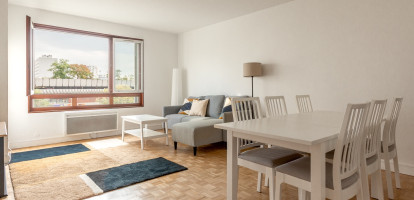


 Français
Français
